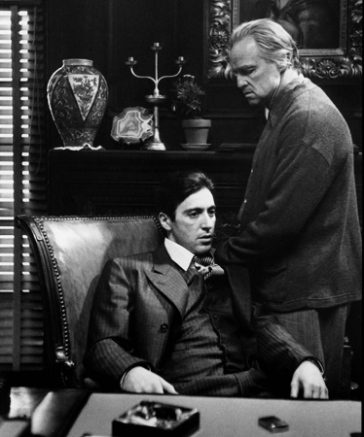My Take on the Leadership Lessons from The Godfather
Lydia Dishman, writing for one of my favorite magazines, Fast Company, posted a great article today on a topic that initially inspired my desire to become an entrepreneur: The Godfather.
I have a distorted view of the epic Puzo novel + Coppola film, dramatizing the rise of organized crime in America. When someone asks me what the story is about, I state plainly: its about capitalism, innovation, and risk, also known as The American Dream.
And before the comments start rolling in, yes it is absolutely true, all of these entrepreneurial virtues are sullied in violence and crime. I read the Valachi Papers back in college, and regardless that this was a brutal time in the history of our country, there was some serious innovation and leadership queues to note from that period.
The federal government was absolutely clueless with handling the sheer organizational power at the helm of this billion dollar enterprise. Since America loves the stories about the self-made man, mixing it with drama, blood, guns, and family makes it the perfect tale to tell.
As I said, my history with the Godfather is confusing. It was the first R rated movie I ever saw, and my developing mind thought the story was about me and my family. Yes, literally.
Here is why: My father’s side of the family resembled the Corleone’s exact. Same number of children, my father was the youngest son of 3 and was the only one who wanted to build a profession outside of the family drama. No, they weren’t bootleggers or gangsters, but growing up on the west-side of San Antonio during the 60s/70s offered a large amount of crime, violence, and oppression.
My grandfather looked strikingly similar to Don Vito. We would go to his house after church every Sunday and the entire family would be there. All cousins, aunts, uncles scattered about the tiny home. The women would make food and gossip, the children would play in the backyard, and the men would gather about the front while my grandfather would sit in a rocking chair in the middle and delegate. He would invite his friends over to visit, and I took it like they were coming to pay tribute to my stoic elderly hero.
I was the same age as that grandson towards the end of TGF Part I, and I too would run about the yard of my grandfather’s house on the west-side while he sat on the porch (dressed eerily like Vito to boot), puffed cigarettes, and spoke to me in Spanish. Every time I see the scene where the grandson is playing with his grandpa Vito, it spurs vivid memories of doing the same with mine.
When he passed away, my father took the role as primary supporter for his entire extended family. With the most successful career out of all the children, he was compelled to keep his family together and see them through all the tough and prosperous times. I admired him–and still do–for taking on such a selfless task.
As I grew older, I obviously decoupled the idea that the la famiglia Corleone was a semi-autobiographical depiction of la familia Martinez, but I still carried the sense that a man can build something out of nothing if he just saw the opportunities and did a better job fixing a problem than anyone else.
So now to the leadership points listed by Ms. Dishman from the words of Justin Moore of Axcient:
1. Build a powerful community. “Someday, and that day may never come, I’ll call upon you to do a service for me.”
2. Hold people accountable. “What’s the matter with you? I think your brain is going soft.”
3. Don’t get emotional. “It’s not personal, Sonny. It’s strictly business.”
4. Be decisive.
5. Spend time with your family. “Do you spend time with your family? Because a man who doesn’t spend time with his family can never be a real man”
You can read her post in full here. All of these points have absolute merits and should be studied and emulated, but the one that I hold most important actually comes from Pacino’s character in Part II:
- Think as everyone else does. “One thing I learned from my father is to try to think as the people around you think…and on that basis, anything is possible.”
I have tried, more than any other skill, to adhere and practice this idea. It’s the fundamental principle underlying #1 on Google’s Mission Statement and the perennial advice surrounding Dale Carnegie’s master opus How to Win Friends and Influence People.
This, above all else, separates the successful from the mediocre, the lucky from the unlucky, the smart from the ignorant.
About this entry
You’re currently reading “My Take on the Leadership Lessons from The Godfather,” an entry on gatsby | magnus
- Published:
- April 2, 2012 / 2:26 pm
- Category:
- influences, life, the journey

1 Comment
Jump to comment form | comment rss [?] | trackback uri [?]